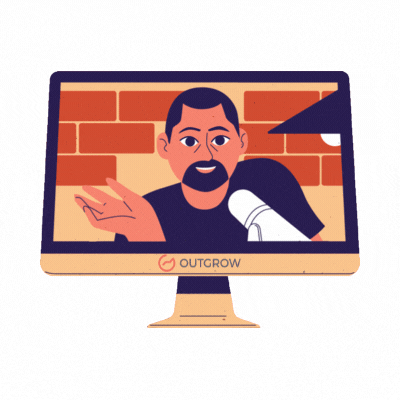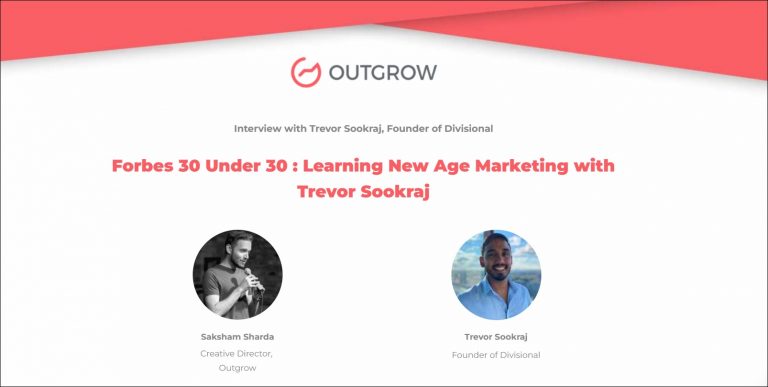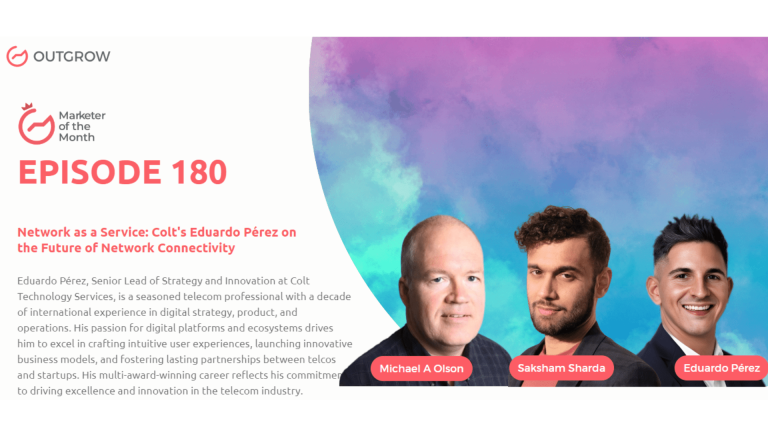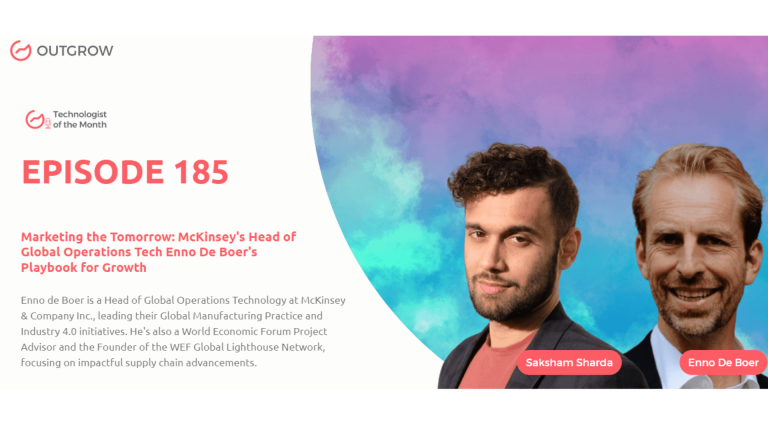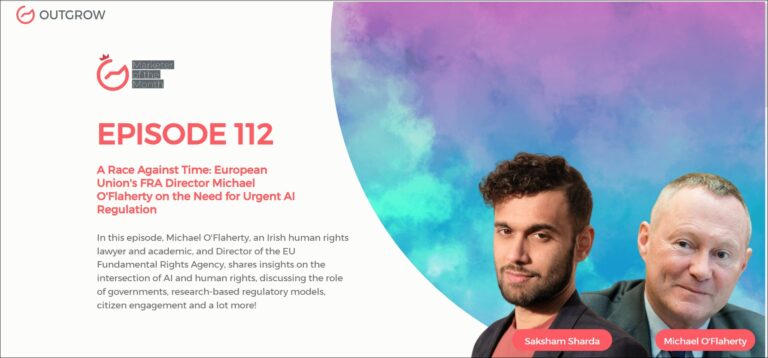Summarize with :
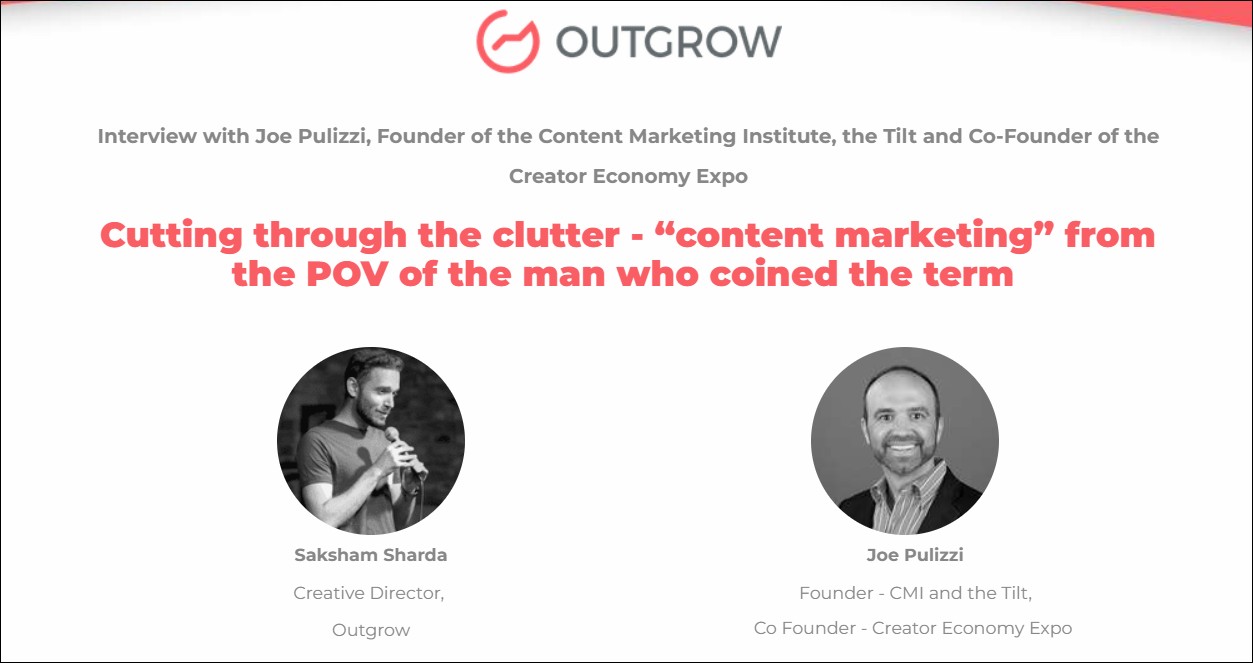
1. Focusing on doing one thing really, really well
2. The evolution of content marketing since 2001 – building and monetizing an audience
3. How original research yields useful content – and helps understand your audience
4. The goal of your content is to establish trust with your audience
5. Creator Economy and Content Entrepreneurship
6. Breaking through with a research project
About our host:
Dr. Saksham Sharda is the Chief Information Officer at Outgrow.co. He specializes in data collection, analysis, filtering, and transfer by the means of widgets and applets. Interactive, cultural, and trending widgets designed by him have been featured on TrendHunter, Alibaba, ProductHunt, New York Marketing Association, FactoryBerlin, Digimarcon Silicon Valley, and at The European Affiliate Summit.
About our guest:
Joe Pulizzi is one of the world’s top content marketing authorities. He has founded three companies, including the Content Marketing Institute (CMI), launched dozens of events, including Content Marketing World. Pulizzi is the recipient of the 2014 John Caldwell Lifetime Achievement Award for content marketing from the Content Council.
The Podcast – Cutting through the Clutter – “Content Marketing” from the POV of the person who coined the term: Joe Pulizzi
Table of Contents
The Intro!
Saksham Sharda: Hi everyone. Welcome to another episode of Outgrow’s Marketer of the Month. I’m your host, Dr. Saksham Sharda. I’m the Creative Director at Outgrow.co. And for this month , Joe Pulizzi founder of the Creator Economy Expo.
Saksham Sharda: Thanks for joining us Joe.
Joe Pulizzi: It’s a pleasure to be here. Thanks for having me.
The Rapid Fire Round!
Saksham Sharda: So, Joe, we’re going to start with a rapid fire round just to break the ice. You get three passes in case you don’t want to answer the question. You can just say pass, but try to keep your answers to one word or one sentence only. Okay.
Joe Pulizzi: You got it.
Saksham Sharda: Alright. So, the first one is at what age do you want to retire?
Joe Pulizzi: Never.
Saksham Sharda: How long does it take you to get ready in the mornings?
Joe Pulizzi: Five minutes.
Saksham Sharda: Most embarrassing moment of your life.
Joe Pulizzi: Pass
Saksham Sharda: Fill in the blank. An upcoming marketing trend is ___________.
Joe Pulizzi: Web3
Saksham Sharda: The city in which the best kiss of your life happened?
Joe Pulizzi: Bowling Green, Ohio,
Saksham Sharda: Pick one, Mark Zuckerberg or Jack Dorsey.
Joe Pulizzi: Jack Dorsey.
Saksham Sharda: The first movie that comes to your mind when I say the word ambition.
Joe Pulizzi: Oh man. Obviously, nothing, I would have an answer for you. I was going to say something like major league or…
Saksham Sharda: That’s Doesn’t
Joe Pulizzi: So, there you go. I’ll go major league.
Saksham Sharda: Go for it. The biggest mistake of your career?
Joe Pulizzi: Waiting too long.
Saksham Sharda: Mm. How do you relax?
Joe Pulizzi: Run.
Saksham Sharda: What advice would you give your younger self?
Joe Pulizzi: Everybody’s making it up as they go along.
Saksham Sharda: A habit of yours that you hate?
Joe Pulizzi: Too much in my email inbox.
Saksham Sharda: And the last question is your favorite Netflix show?
Joe Pulizzi: Stranger things.
The Big Questions!
Saksham Sharda: Okay. Well, that’s the end of the rapid-fire round. You scored 9/10 because you had one pass and we’re going to go into the longer form questions now.
Joe Pulizzi: All right. Great.
Saksham Sharda: Tell us more about the Creator economy expo and how you managed to get world class speakers and content creators on board.
Joe Pulizzi: Well, first of all, I come from the events industry. I’ve been doing events for over 20 years, so I’m passionate about that. And as I made my move, so I would grow up in the content marketing industry, been doing that for over 20 years owned, started Content Marketing Institute. We still, my wife and I sold that business in 2016. And then I started to fall in love with what we’re calling the Creator Economy or what I call Content Entrepreneurs. And basically, helping those individuals try to figure out their business models. How can you create content on an ongoing basis and actually become independent, financially independent, make a living and not just create all this content as a hobby? And there was no physical event that we could find. And to my knowledge, there’s still none focusing on the middle class of content creators out there. There’s lots of conferences for big influencers with million plus followers on TikTok and Instagram. But what about the content creator that has 5,000 subscribers or 10,000 subscribers? And they’re in industry niches that you don’t know of anymore. They need an event too. They need somewhere that they can get together. They can network, they can learn from each other. And that’s why we decided to create the annual event Creator Economy Expo. We had just had our event in May of 2022. And we wanted to put on an experience that they would never forget and something that would continue on after the event. So we ended up getting 350 plus to Phoenix, Arizona. And to thank you for recognizing we had a great speaker lineup and we were all able to learn from each other and, and continue this journey on. And I want us, there’s so many individuals out there creating content on all different platforms, but most of them aren’t financially independent and not even close to it because they don’t have the right business model for it. So that’s our job to teach them how to create a business model out of this thing.
Saksham Sharda: And what would be off the top of a head, a tip for creating content for our audience that you’d like to give right now?
Joe Pulizzi: Yeah, so an easy one is focus on one platform. There are so many content creators out there saying, oh, I’ve got to be everywhere. No, you don’t have to be everywhere. If you look at the model for a content creator, becoming a content entrepreneur, they start by doing one thing really well. They’re a blogger, they’re a writer, they’re a on TikTok. They’re doing YouTube shorts. They’re a Twitch streamer. Like what are you? And I think so many of us go out there say we got to do all the things. And actually, that’s a mistake. So don’t do all the things you can be on those other channels. You can promote your work on those channels, but you have to focus on being great at one thing like a Mr. Beast, like a PewDiePie like some of the best writers in the world, they focus on doing one thing. Well, so just do that.
Saksham Sharda: And when you first started using the term content marketing back in 2001, what was your vision for the business back then and how do you believe it compares to the present state of the industry?
Joe Pulizzi: Well, it was. I mean, you got to remember that was before search engines were really a thing that was before social media came out and as we were trending that direction, I was lucky enough to be in business-to-business publishing. And as we were working with some of these advertisers, we realized, oh, well, they can’t just advertise anymore. They want to actually get attention from their audience. They want to build an audience and they want to monetize that audience. How are they going to do that? They better start delivering valuable, relevant, compelling information on a consistent basis to a targeted audience. That’s the definition of content marketing. So, it was called custom media and custom publishing at the time. And the problem was that if we were to, I was targeting marketers, I wanted to sell marketers content marketing products. And so, you had to call it something marketing, you can’t call it custom publisher or custom media. They don’t know what those things are. So, I said, okay, let’s call it content marketing, just like search engine marketing, just like social media marketing. And it started to pick up and snowball probably by 2010. It really started to take off. We had our first event, content marketing world in 2011. And now, I mean, so a lot of people perceive this as differently. When you look at a media company versus a non-media company, like a New York times versus a Cisco Systems, I don’t see it as any different. I see a company that’s trying to build an audience and monetize that audience. And then they have products and services to do that. New York times does that mostly through direct revenue, they do it through sponsorship. They do it through paid subscriptions. Cisco Systems do it, does it by selling more products and services, but they’re doing the same things. They all have media departments; they all have directors of content or content marketing or chief content officers. And they’re all trying to build subscribers and then monetize those subscribers. And that’s where we’re at in 2022 and into 2023. So, everyone is a media company. It just depends on if you take that seriously. And then the type, if you really do take it seriously, then you’re going to create content operations that are going to build an audience in a community over time. And then you can look at the ways to generate revenue.
Saksham Sharda: And so, do you agree with the statement that buyer insights should be a key component of your content strategy?
Joe Pulizzi: I think that you should use any research you possibly can to understand your audience. So, if you have insights into how they purchase a product, absolutely. If you know what they’re searching for on social media or on, on, on search engines to get their information about what they’re going to buy or how they buy or how they spend their day, you definitely want to use that into your content. But I also want you to think about what, what do you want to position yourself as the leading expert in you? Can’t create content about all things and you probably have way too much product content already. If you look at most companies, they’re very heavy on product content, not so great on valuable, relevant information. That’s not about the product that’s delivered on a consistent basis, at least. So we’ve got to take all those resources and kind of move them around a little bit. So, we can say, oh, okay. We really need more in this direction to position ourselves as the leading expert. So, it’s definitely a process. And we’re seeing this evolution and content marketing is a muscle that most organizations haven’t used very much or very well. So, it’s sort of atrophy, if you will, even though hundreds of years ago, that’s the way we went to market. So, a lot of things are changing and, and then you’re competing with everybody, right? You’re competing with the Netflixes and the Googles of the world, and you’re competing with your actual real competitors. So, it’s getting more difficult as we move further, even with all the technology.
Saksham Sharda: So, speaking of value itself in the context of the creator economy, what value in your opinion do creators create exactly?
Joe Pulizzi: So, any content creator should try to do one or two things, try to help my audience live a better life, or get a better job, have a better career. I mean, anything around those things. So, if you’re a content creator, you’ve got to ask yourself, what am I doing? What’s the mission? And that’s where it differs from influencers. Most influencers, I won’t say most, a lot of influencers that you see out there, they open up their lives. They’re talking about themselves, it’s pure entertainment, which is fine. But I, I think that we can do more as content creators and content entrepreneurs. So, who is my audience and where am I trying to deliver differentiated value so that I can take that audience to the next level? Cause we’re trying to create a subscriber from that audience and monetize that audience over time. To do that we need to build trust. We need to deliver ongoing content that solves their needs and pain points. So I want to know if I’m talking to a content creator, who’s your specific audience and what’s your content tilt. That means what is your differentiation so that you can cut through all the clutter. What is that? And then you can start to figure out how you can impact your audience on a regular basis. And then it gets into process, right? Oh, okay. Well, here’s my article, here’s my search engine phrase. Here’s the audience outcome that I’m trying to deliver from every piece of content. So that’s what I’m going to challenge a content entrepreneur to do every piece of content you create. What’s in it for the audience, the community, what is the audience outcome? So often we’re insular. We’re thinking about, oh, this is what I want to talk about, which is fine. But if you get in that habit too much, you’re not thinking about, I need to make change in my customers and my audience’s life. And how am I going to do this with this piece of content today?
Saksham Sharda: And, and in a post pandemic world, how does this change, do you think the Creator Economy is strong enough to withstand a return to real life experiences?
Joe Pulizzi: Yeah, because it doesn’t matter if it’s digital, it’s in person. I mean, we just launched a physical event hopefully the end of this pandemic. I think print magazines are coming back. So, the challenge is, is that every individual has only 24 hours in the day. We’re not getting more time. And that’s what a content entrepreneur or content creator are going after. Somebody’s attention. We’re already spending what, look at the stats, seven to nine hours a day on different media devices and television and Netflix and social media and TikTok. It’s already crazy. So you’re like, okay well, you want 10 or 15 minutes of that day. You better be amazing. You better. I mean, and so that’s where you have so many content creators. I mean, if you look at the stats, you’ll say, oh, there’s 50 million people out there trying to do this for a living or there’s 250 million people, or there’s going to be a lot of turnovers. There’s going to be a lot of people in the first six months that go out looking for a job because they don’t realize that it takes a long period of time of consistent delivery focusing on something that you can do better than anyone else to build that audience. So, you have a lot of people that come become disenchanted with the whole idea, because, oh, I’m going to do this for a living. And then you realize, oh wow. It really does work like a real business. It does take two to three years to really build this thing. So, I don’t think, I mean, there’s going to be more creators tomorrow than there was the day before, just because technology is going to make that possible. How many of those content creators turn into real content entrepreneurs? That’s my concern. Because anybody can create content. My mom’s on Facebook, she’s a content creator. What does that mean? We’re really talking about people that want to become professionals and I’m concerned if they don’t have the patience and they don’t set up their business or their lives. Like when my wife and I started our own content creation business in 2007, we called it the ramen noodle and bologna years because we had to cut our expenses down so much because it takes time and it took us actually three years before we knew that we were actually going to make this thing. So that’s my concern, not the content creation part, but the entrepreneurship part.
Saksham Sharda: So speaking of your own journey, you’ve mentioned online several times of a research project that helped you break through in your content entrepreneurial journey. Could you elaborate on this project and how it specifically helped you accomplish a successful exit?
Joe Pulizzi: So yeah, I mean, let’s see, we started the business in 2007 and in 2008, 2009, we started our, our research project. Because again, my belief is depending on your area of expertise, you, you need to be one of the leading experts. You need to present yourself as one of the leading experts and how best do you do that? We started creating our own independent research. We worked with a lot of partners to make this happen, but we created, you know, basically it was what is content marketing and what, what is the state of the content marketer, if you will. So we went through who is the content marketer was content marketing. What are we doing out there? We using blogs and print and events and social media. And we started to go through those things. And slowly, you know, year after year, we kept doing these over and over again. We did position our organization as one of the, the leading resources for that. And then that enabled us to create content marketing world, the event, do the podcast, do all the things that we’re doing. And then we had a successful exit in 2016. So, I think when a lot of people are trying to figure out, I’m just doing a blog or I’m just doing a podcast or whatever. And you want to position yourself as an expert doing the creating the piece of research for the industry is an absolute wonderful way to go about doing this. And we just launched The Tilt, our new business in 2021. And the first thing we did was we launched, what’s the state of the content entrepreneur. What’s the, what is this creator economy that everyone’s talking about? Because everyone talks about the software, but not about the content creator. So we wanted to put focus on the content creator and do that. And, and it’s already been very successful. We’re working on our second annual edition. So my recommendation would be yes, if you want to become known a piece of research is a great way to do it, but if you’re going to do it, it’s not a one off, it should be an annual thing or a quarterly thing. Whatever you decide to do. Ours is an annual. When we did it for content marketing Institute, it was an annual and it takes a lot of work and a lot of partnership and you have to have a lot of people, you know, submit their survey questions, but it’s absolutely worthwhile because then you’ve got not only the research report, but you’ve got content for 12 months that you can break out. You’ve got questions they’ve asked. You could go to each individual data point and say, wow, here’s a great post. Here’s a great podcast. And you could fill out your editorial calendar for a year because you have all this insight from your customers.
Saksham Sharda: And let’s pivot a little. Could you tell us also about your work with the Orange Effect Foundation and how you came up with that name?
Joe Pulizzi: Thank you. Yeah. We’re everything orange. I got a little orange on today as we’re, we’re talking about this. So, in 2007, when we launched what became Content Marketing Institute, I always, I followed people like Brian Tracy, like Napoleon Hill and always believed that if you’re going to start a business, you should always give something back. So, the idea of starting some charitable initiative was always there. So, there’s, there’s a couple things. We started the business and I had all my pictures taken were with the color orange. I wore orange all the time and I became known for that. It wasn’t a purposeful decision, but people started because I was wearing orange shirts all the time. People were like, Joe when I wasn’t wearing orange, it was a big deal. And that’s when it first hit me. I mean, I’d go to the grocery store and people come up to me and I’m wearing a gray shirt and they say, Joe was so something wrong. You’re not wearing orange. I’m like, okay. I branded myself to this orange. Now I wear orange everywhere. We’re sort of known for the color orange. And so, then when we went out and said, well, let’s do this nonprofit initiative around speech therapy. My wife and our oldest was born on the autism spectrum. So, they’re doing fantastic now. And speech therapy got them there to where they’re in a university right now, succeeding. Everything’s wonderful. But what we found out was a lot of families, they don’t have access to the speech therapy they need, even though that’s what the child absolutely needs. We found out that there’s so many families that just can’t afford it. And when you’re looking to say, okay, well I can afford dinner tonight or speech therapy, you’re going to choose dinner. So you have a survival method. So we’re like, okay, can we create an organization that helps people children and families get the speech therapy they need that they can’t afford. So we created Orange Effect Foundation to do that started in 2007, 501(c)3 in 2014. And now I think we’ve got over 260 children with grants out to help them with their speech therapy in 34 states in the United States. So I mean, it’s not a huge organization, it’s something small. But we have more requests for funding than we can fulfill. So we have a lot of work to do yet. So yeah, it was just Orange Effect. My whole thing about orange is affecting change. I think it’s a powerful color, powerful word. And we’re like, okay, well we want to affect some change. So we might as well call it the Orange Effect Foundation. So that’s what we’ve been doing. And we mix that in with the business and everything we do in the business is related. So basically, any profit that we get a portion of that profit always goes back to the foundation.
Saksham Sharda: That sounds like a great initiative. So, the last question for you is what would you be doing if not all this?
Joe Pulizzi: That’s an easy one. I would be writing fiction novels. I would be doing when, so, so the quick thing quick answer to that is my wife and I sold in 16 stayed on until 17, took a full sabbatical year in 2018. I highly recommended if you could do that. And in 2019 I wrote; my first novel was called the will to die. It was a mystery thriller, which featured a marketing person at the center. I feel there’s just not enough mysteries out there featuring marketing people anyways because of COVID and some other reasons. I got back into business and started The Tilt and Creator Economy Expo. But at some point, I would like to go back and write a sequel to the will to die. And I enjoy writing. Writing that book was the most difficult thing I’ve ever done, but it’s very fulfilling. And I would like to get back to doing that again.
Saksham Sharda: And what’s, I guess you mentioned the sabbatical, but what is one thing that content creators can do in their daily lives to get down to finally writing their own novel, which everyone wants to do, but I guess the ball just sucks you in and you never get down to doing that?
Joe Pulizzi: Yeah. it’s tough. I mean, you and I probably both know a thousand people that have a novel or a half-written novel on their computer or in their desk drawer or whatever. It’s much easier for me to write a nonfiction book I’ve written seven of them. You can write in a lot of different ways. I can write a blog post, which becomes a chapter. I can do those over months to build a book it’s different with a novel or something in fiction. You need to write every day. So, I would say if that’s something you want to do, you have to basically say for the next 30 days, I’m going to get up every day and write for an hour, time limit or a thousand words. I tried to do a thousand words. I said, I’m not stopping this morning until I write a thousand words. Now the first two or three or four or seven or 10 days, it’s terrible. Like, I go back and look at the work that I did when I started. It was absolutely horrible. Nobody would want to see that work, but you start getting yourself into a rhythm and you find your voice and the story starts to right itself. But you have to teach your body to do that. If you will teach yourself to do that and get to that point. And it probably wasn’t until about 20 or 30 days till I really felt something work. And then after four or six months, I had a first draft of a novel. So that’s what I would recommend doing is just doing the work and you’re going to hate it the first week, but get up every day, spend some time word limit and it’ll work. It’ll absolutely work for you.
Saksham Sharda: Okay. Fair. I’ll try that.
Let’s Conclude!
Saksham Sharda: Well Thanks everyone for joining us for this month’s episode of Outgrow’s Marketer of the Month. And thanks for joining us Joe.
Saksham Sharda: Check out the website for more details and we’ll see you once again next month with another Marketer of the Month.


